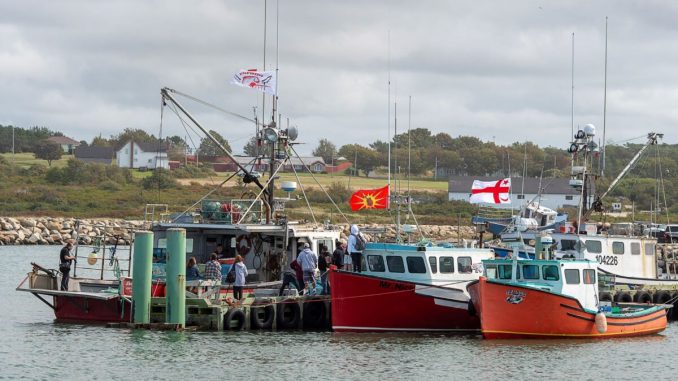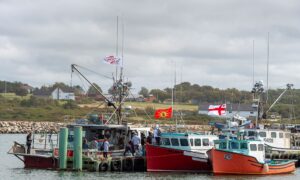

The United Nations anti-racism committee wants Canada to answer to allegations of racist actions committed against Mi’kmaq lobster fishers in Nova Scotia.
In a letter issued on April 30, the Committee on the Elimination of Racial Discrimination makes reference to incidents last fall where members of the Sipekne’katik First Nation encountered violence. The incidents were related to a dispute with non-indigenous fishers aggrieved that the Mi’kmaq band was fishing outside of the federally regulated season. The attacks included destruction of a lobster storage facility being used by the band and a van owned by a band member.
The letter, signed by committee chair Yanduan Li, a representative of China, alleges that the RCMP and the federal Department of Fisheries and Oceans (DFO) “failed to take appropriate measures to prevent these acts of violence.”
The First Nation argues that the Supreme Court’s 1999 Marshall decision, which affirmed the treaty right of the Mi’kmaq people to fish in the area in pursuit of a “moderate livelihood,” allows its members to fish outside of the season. But there are disagreements between the different sides over whether fishing outside of the fishing season is allowed as part of the “moderate livelihood” definition. The DFO says all fishery must occur within the commercial season so as not to disturb conservation efforts.
Ken Coates, a professor at the Johnson-Shoyama Graduate School of Public Policy, who wrote a book on the Marshall decision, criticized the UN’s involvement in the affair.
“I always get very angry and very disappointed when United Nations stick their nose in on Indian Affairs because they constantly misrepresent things,” Coates said in an interview.
Coates says that when the UN criticizes countries like Australia and the United States or Scandinavian nations, those countries push back.
“In Canada’s case, we’re kind of obsequious when it comes to the UN. It empowers the UN to be very critical of Canada,” he said.
The UN was the subject of recent controversy after China, Russia, and Cuba—countries that regularly appear on human rights organization’s lists of suppressers—won seats on the UN human rights council. Most recently, Iran was elected to the UN’s commission on women’s rights, despite the country’s poor track record on women’s rights.
China, whose representative chairs the committee probing the racism allegation against Canada, was recently declared by the House of Commons to be committing genocide against Uyghur Muslims.
Solutions Overdue
The British Crown and the Mi’kmaq people signed a treaty in the 18th century that ensured the latter’s fishing rights in the area. In the Marshall decision in 1999, involving a Mi’kmaw man named Donald Marshall Jr. who was arrested for fishing during closed-season times, the Supreme Court of Canada affirmed that the treaty gave the Mi’kmaq the right to hunt, fish, and engage in other gathering activities in order to sustain a “moderate livelihood to support themselves.
Coates says much good has come of the ruling.
“It has been one of the most successful commercializations of indigenous rights in Canadian history. You have 1,000 aboriginal people in the Maritimes who are fishing on a regular basis, making a good living,” he said.
But issues of conflicting interests still need to be balanced, which remain unanswered since the 1999 ruling.
“There have been lengthy discussions, long conversations, legal threats on both sides, … but 22 years is a long time to leave something unresolved,” Coates said.
“First Nations people are going to stay really angry because they see any benefits of the First Nations as being a loss to themselves. And the government, by the way, is completely right adhering to conservation as a top priority.”
Ian Madsen, senior policy analyst at the Frontier Centre for Public Policy, agrees that solutions are overdue.
“We’ve had aboriginal peoples in Canada since before there was Canada. We’ve had fisheries in Canada before there was Canada. … The [federal government has] just fallen behind and fallen down on the job.”
Madsen said clarification of “moderate living” would help move the process forward.
“The Mi’kmaq understandably feel that the treaty entitles them to a reasonable living and some reasonable amount of harvesting. But what does that mean? That needs to be better defined and calculated.”
Non-indigenous fishers should not bear the burden of the policy failure of governments, Madsen adds.
“If they do lose their livelihoods or suffer serious material, financial damages, then the federal or provincial governments should compensate them,” Madsen said. “They’re understandably upset, and a few of them took it to an intolerable level with their violent actions, but that doesn’t mean that they don’t have a serious grievance too.”
Despite recent tensions, Coates said interracial harmony has actually grown.
“Ironically, things have been getting better, getting a lot better. Those commercial fishermen that are non-aboriginal people, they’re spending more time on the water together [with aboriginals]. They’re on their boats together. They’re fixing each other’s boats,” Coates said.
“Things have actually worked out quite well, and in fact much better than people expected in 1999.”
With files form The Canadian Press






Be the first to comment